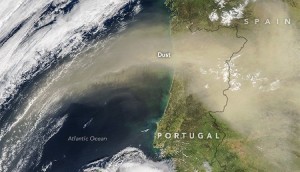The clouds of Saharan dust that have recently lowered over Greek skies are yet another phenomenon associated with climate change and could be here to stay, atmospheric physicist Christos Zerefos said in statements to the Athens-Macedonian News Agency (ANA) on Sunday.
The destabilisation of the climate, already apparent, would increase in the years to come and make extreme weather events increasingly frequent. As a result, more days where dust from the African continent reached the northern shores of the Mediterranean were expected, he said.
“There are signs that the frequency of the transfer of dust will increase. Up until now we do not have clear indications that transfer has already increased. However, because extreme phenomena are increasing worldwide, I think we should expect that the transfer of the dust will also increase in frequency,” Zerefos said. He predicted that Greece will find itself dealing with dust clouds several times until the summer.
“It is likely that we will see the dust many times up until the summer and even during the summer. We have dust in July as well. In fact, we measured the dust in an older experiment with the painter Panagiotis Tetsis to see how the colours change at sunset as a result of the transfer of this dust,” he noted.
He also pointed out that this was not a new phenomenon and that, when the weather conditions allowed, the dust could reach as far as the UK, producing the phenomenon known as “blood rain” that was considered a bad omen in medieval times.
Zerefos was reassuring about the impact of the dust on human health, however, pointing out that the dust from Sahara was harmless since it was essentially sand.
“If it comes from an area with pollution, or if the cloud passes over an industrial and heavily polluted area it can transfer a part of the air pollution, the particles that are polluted,” he added. Among such areas were large cities, such as Cairo, but analysis of the residue left behind by in the soil after rainfall showed that levels of dangerous substances, such as heavy metals, were extremely low and well below the World Health Organisation limits, Zerefos noted.
Source: thegreekobserver
Ask me anything
Explore related questions





